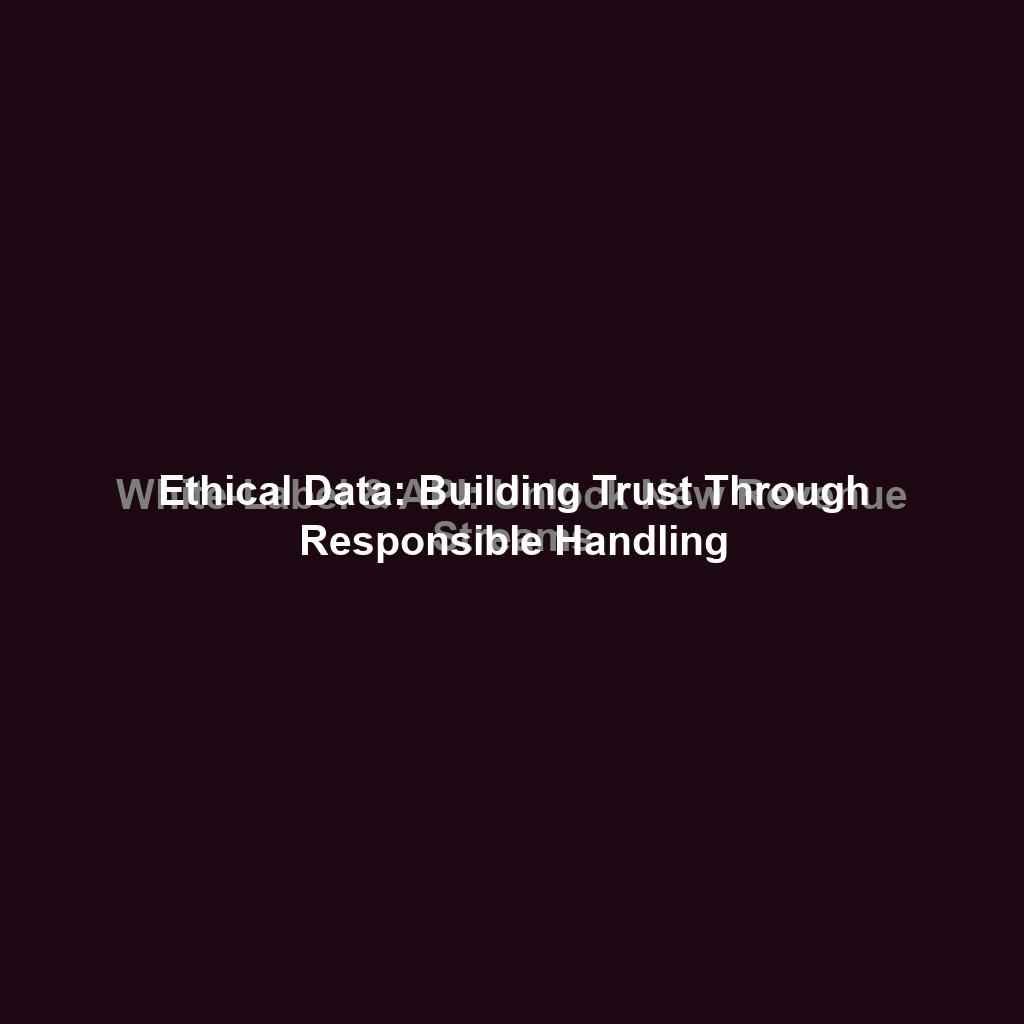In today’s data-driven world, organizations are increasingly relying on data to make informed decisions, improve their operations, and enhance customer experiences. However, the pursuit of data-driven insights must be balanced with a strong commitment to ethical data handling. Building trust with customers and stakeholders is paramount, and this requires adhering to strict data privacy, security, and transparency standards. This article will explore the ethical considerations of data collection, storage, and usage, and provide best practices for building a data-first culture that prioritizes both innovation and responsibility.
The Ethical Imperative of Data-First Cultures
A data-first culture isn’t just about adopting the latest analytics tools; it’s about embedding data ethics into the very fabric of your organization. This goes beyond simple legal compliance. It’s about demonstrating a genuine commitment to respecting individual privacy rights and using data in a way that benefits both the business and society. When data is misused, the consequences can be severe – loss of customer trust, reputational damage, hefty fines, and even legal action.
Key Insight: Ethical data handling is no longer optional; it’s a strategic imperative for long-term success. It safeguards your brand reputation, builds customer loyalty, and ensures sustainable growth.
Consider the case of a major social media platform that faced intense scrutiny for its data privacy practices. The platform collected vast amounts of user data, including browsing history and location information, without adequately informing users or obtaining their explicit consent. This led to a public outcry, regulatory investigations, and a significant decline in user trust. The company’s reputation suffered a major blow, and it faced substantial financial penalties.
This scenario illustrates the potential risks of neglecting ethical data handling. In contrast, companies that prioritize data ethics are more likely to build strong relationships with their customers, attract and retain top talent, and gain a competitive advantage in the marketplace.
Key Ethical Considerations in Data Handling
Several key ethical considerations must be addressed when building a data-first culture:
- Data Privacy: Protecting individuals’ personal information and ensuring compliance with privacy regulations like GDPR and CCPA.
- Data Security: Implementing robust security measures to prevent data breaches and unauthorized access.
- Transparency: Being open and honest with customers about how their data is collected, used, and shared.
- Fairness: Avoiding bias in data collection and analysis to ensure equitable outcomes.
- Accountability: Establishing clear lines of responsibility for data handling practices.
Data Privacy: Respecting Individual Rights
Data privacy is the cornerstone of ethical data handling. It’s about respecting individuals’ right to control their personal information. Key best practices include:
- Obtaining explicit consent: Clearly informing users about how their data will be used and obtaining their explicit consent before collecting it.
- Providing data access and control: Allowing users to access, modify, and delete their personal data.
- Minimizing data collection: Collecting only the data that is necessary for a specific purpose.
- Anonymizing and pseudonymizing data: Protecting individuals’ identities by removing or obscuring personally identifiable information.
For example, consider a healthcare provider implementing a new electronic health record system. To ensure data privacy, the provider should obtain patients’ informed consent before collecting their medical information. Patients should also be given the ability to access their records, correct any inaccuracies, and opt out of data sharing with third parties. Furthermore, the provider should implement strong security measures to protect patient data from unauthorized access and breaches. They also must adhere to HIPAA (Health Insurance Portability and Accountability Act) regulations.
Data Security: Protecting Against Breaches
Data security is crucial for maintaining trust and preventing harm. A data breach can have devastating consequences for both individuals and organizations. Best practices for data security include:
- Implementing strong encryption: Protecting data at rest and in transit using robust encryption algorithms.
- Using multi-factor authentication: Requiring multiple forms of authentication to prevent unauthorized access.
- Regularly patching and updating software: Addressing security vulnerabilities in software and systems.
- Conducting regular security audits: Identifying and addressing potential security risks.
- Implementing data loss prevention (DLP) measures: Preventing sensitive data from leaving the organization’s control.
I once worked with a financial institution that was targeted by a sophisticated phishing attack. Hackers sent emails that appeared to be from legitimate sources, tricking employees into revealing their login credentials. To prevent future attacks, the institution implemented multi-factor authentication for all employees and provided regular cybersecurity training to raise awareness of phishing scams. They also invested in advanced threat detection systems to identify and block malicious activity.
Transparency: Building Open Communication
Transparency is essential for building trust with customers and stakeholders. It’s about being open and honest about how data is collected, used, and shared. Key best practices include:
- Providing clear and concise privacy policies: Explaining data practices in plain language that is easy for users to understand.
- Offering data usage notifications: Notifying users when their data is being used in new or unexpected ways.
- Being responsive to data inquiries: Promptly addressing users’ questions and concerns about their data.
- Publishing data transparency reports: Providing regular updates on data requests, security incidents, and other relevant data metrics.
For example, an e-commerce company should clearly explain in its privacy policy how it collects and uses customer data, including browsing history, purchase data, and demographic information. The policy should also outline the company’s data security measures and its policies for sharing data with third parties. Customers should be able to easily access and understand the privacy policy before making a purchase.
Fairness: Avoiding Bias in Data
Data can perpetuate and even amplify existing societal biases if not carefully managed. Algorithmic bias can lead to discriminatory outcomes in areas such as hiring, lending, and criminal justice. Best practices for ensuring data fairness include:
- Identifying and mitigating bias in data: Analyzing data for potential sources of bias and taking steps to mitigate them.
- Using diverse datasets: Ensuring that datasets are representative of the population being analyzed.
- Developing fair algorithms: Designing algorithms that are free from bias and that produce equitable outcomes.
- Monitoring algorithm performance: Regularly monitoring algorithms for bias and taking corrective action as needed.
Example Scenario: A hiring algorithm trained on historical data that predominantly features male candidates may unfairly disadvantage female applicants. To address this, the data science team needs to retrain the model with a more balanced dataset and implement bias detection techniques to ensure fair outcomes.
Accountability: Establishing Responsibility
Accountability is essential for ensuring that data is handled ethically. Organizations need to establish clear lines of responsibility for data handling practices. Key best practices include:
- Appointing a data protection officer (DPO): Designating a senior executive to oversee data privacy and security.
- Establishing a data ethics committee: Creating a cross-functional team to address ethical issues related to data.
- Developing data governance policies: Establishing clear rules and guidelines for data handling.
- Providing employee training: Educating employees about data privacy, security, and ethics.
- Conducting regular data audits: Assessing data handling practices to ensure compliance with policies and regulations.
Building a Data Governance Framework
A strong data governance framework is essential for ensuring responsible data practices. A data governance framework provides a structure for managing data assets, defining data roles and responsibilities, and establishing data policies and procedures. Key components of a data governance framework include:
- Data strategy: Defining the organization’s overall data goals and objectives.
- Data architecture: Designing the organization’s data infrastructure and data flows.
- Data quality: Establishing standards for data accuracy, completeness, and consistency.
- Data security: Implementing security measures to protect data from unauthorized access.
- Data privacy: Ensuring compliance with privacy regulations and protecting individuals’ personal information.
- Data ethics: Establishing ethical principles for data handling and usage.
For example, I advised a large retail company on developing a data governance framework. We started by defining the company’s data strategy, which focused on using data to improve customer experience, optimize supply chain operations, and drive revenue growth. We then developed a data architecture that included a centralized data warehouse, data lakes, and data analytics platforms. We established data quality standards to ensure that customer data was accurate and complete. We also implemented strong data security measures to protect customer data from breaches and unauthorized access. Finally, we developed a data ethics policy that outlined the company’s commitment to responsible data handling.
The Importance of Employee Training
Employee training is critical for ensuring that all employees understand and adhere to ethical data handling practices. Training programs should cover topics such as:
- Data privacy regulations: GDPR, CCPA, and other relevant regulations.
- Data security best practices: Password management, phishing awareness, and data encryption.
- Data ethics principles: Fairness, transparency, and accountability.
- Data governance policies: The organization’s rules and guidelines for data handling.
- Incident response procedures: How to report and respond to data breaches and security incidents.
Training programs should be tailored to the specific roles and responsibilities of employees. For example, employees who handle sensitive customer data should receive more in-depth training on data privacy regulations and security best practices. Data scientists and analysts should be trained on how to identify and mitigate bias in data and algorithms. Regular refresher training should be provided to ensure that employees stay up-to-date on the latest data privacy, security, and ethical considerations.
Best Practice: Implement a mandatory annual data ethics and compliance training program for all employees. This program should cover key topics like data privacy regulations, security protocols, and ethical decision-making frameworks.
Building Trust with Customers and Stakeholders
Ultimately, ethical data handling is about building trust with customers and stakeholders. When organizations demonstrate a strong commitment to data privacy, security, and transparency, they are more likely to earn the trust and loyalty of their customers. This trust can translate into increased customer satisfaction, brand loyalty, and revenue growth. Organizations that prioritize ethical data handling are also more likely to attract and retain top talent, as employees increasingly value working for companies that are committed to social responsibility.
Here are some practical ways to build trust:
- Communicate clearly and openly: Be transparent about your data practices and explain how you are protecting customer data.
- Empower customers to control their data: Give customers the ability to access, modify, and delete their personal information.
- Be responsive to customer inquiries: Promptly address customers’ questions and concerns about their data.
- Demonstrate a commitment to fairness: Ensure that data is used in a way that is fair and equitable to all customers.
- Take responsibility for data breaches: If a data breach occurs, be transparent about what happened and take steps to mitigate the damage.
By prioritizing ethical data handling, organizations can build a data-first culture that is both innovative and responsible. This will not only help them achieve their business goals but also build a more sustainable and trustworthy future for the data-driven world.
Staying Compliant with Data Privacy Regulations
Navigating the complex landscape of data privacy regulations is a crucial aspect of ethical data handling. Regulations like GDPR (General Data Protection Regulation) in Europe and CCPA (California Consumer Privacy Act) in the United States impose strict requirements on how organizations collect, process, and store personal data. Failure to comply with these regulations can result in significant fines and reputational damage.
To stay compliant, organizations need to:
- Understand the applicable regulations: Identify the data privacy regulations that apply to your organization based on your location and the types of data you collect.
- Conduct a data privacy audit: Assess your data handling practices to identify any gaps in compliance.
- Implement necessary controls: Implement technical and organizational measures to ensure compliance with applicable regulations.
- Monitor compliance: Regularly monitor your data handling practices to ensure ongoing compliance.
- Stay up-to-date: Keep abreast of changes to data privacy regulations and adapt your practices accordingly.
I recently assisted a multinational corporation in achieving GDPR compliance. We conducted a comprehensive data privacy audit, identified several areas where the company was not fully compliant, and implemented a range of technical and organizational measures to address these gaps. This included updating privacy policies, implementing data encryption, and providing employee training. The company successfully achieved GDPR compliance and avoided potential fines and reputational damage. For a deeper understanding of GDPR, refer to the official GDPR documentation available on the European Union’s website (https://eur-lex.europa.eu/eli/reg/2016/679/oj). Similarly, for CCPA, consult the California Attorney General’s website (https://oag.ca.gov/privacy/ccpa).
Conclusion: The Future of Ethical Data Handling
Ethical data handling is not just a trend; it is a fundamental requirement for building a sustainable and trustworthy data-first culture. As data continues to play an increasingly important role in our lives, organizations must prioritize data privacy, security, transparency, fairness, and accountability. By embracing these ethical principles, organizations can build trust with customers and stakeholders, attract and retain top talent, and gain a competitive advantage in the marketplace. The future of data handling lies in building a culture of responsibility, where data is used to benefit both businesses and society.
If you’re ready to take the next step in crafting a data-first culture that prioritizes ethics and compliance, consider reaching out for a consultation. We can help you develop a comprehensive data governance framework and implement best practices for ethical data handling.
This article was optimized and published by Content Hurricane.


